2024 was the year I found myself spending way too much time on Twitter (okay, fine, X), and somehow, I ended up right in the middle of all these heated book debates. The funny part? Rather than actively contributing to these discourses (or to use Tweep language, “hot takes”), I watched from the sidelines.
I’m in a couple of book groups and have book and writing enthusiasts as mutuals, and while I hoped to see more conversations from African readers, I ended up appreciating perspectives from all over the world. My algorithm finally got the memo about how eclectic I am because now it’s feeding me book talks from both ends of the spectrum. Some titles in this list made me raise an eyebrow, others got banned, and some are about to, but all of them are shaking things up.
As an aside, these books, in my opinion, are among the best books of 2024. I mean, if you’re not good enough, no one’s gonna wanna (I don’t know exactly how this works) talk about you, right?
So, here, I present you, 5 of the most controversial books of 2024.
1. Only Big Bumbum Matters Tomorrow by Damilare Kuku
Ouida Books’ “Only Big Bumbum Matters Tomorrow by Damilare Kuku” throws you off from the very first glance. The title alone raises eyebrows; it’s bold, playful, and downright provocative.
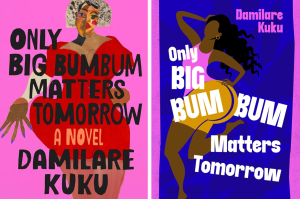
Cover Image for Only Big Bumbum Matters Tomorrow | Source: Brittle Paper
I wasn’t really aware of its release in October/November of 2023 until when it went “somewhat” viral around July 2024. It was then I realized I needed to read it to see what the noise was all about.
But the surprising part was, people who hadn’t even flipped a page were already dropping their hot takes, series of essays, and think pieces, with many arguing it’s a gimmick and making the book sound unserious.
This outright (or should I say, subtle) dismissal leads us to that classic “don’t judge a book by its cover” quote.
What’s interesting is that this reaction felt almost like an extension of the criticism aimed at Kuku’s debut short story collection, “Nearly All the Men in Lagos Are Mad.”
Of course, it’s a pattern, and I think she’s brilliant in the way she frames her titles. But as catchy and sensational as she makes her book titles, she doesn’t compromise on their quality. Starting from the dedication.
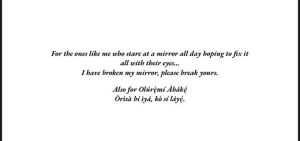
So if you think “Only Big Bumbum Matters Tomorrow” is controversial because of its title, wait until you get into the book’s content. It’s deeper, smarter, and way more complex than just its name.
The novel looks beyond surface-level humor and dives into themes of identity, self-worth, and the pursuit of validation—both in real life and on social media.
It also critiques societal pressures on body image, sexuality, and performance, all wrapped up in the lens of a young Nigerian woman navigating her place in the world. It’s filled with raw, vulnerable moments that tap into the kind of deep-seated issues we would rather avoid talking about.

A post from an X user
I think we should expect more from this author in the future, because I know for a fact that this is far from the last we’ll hear of Damilare Kuku.
At this point, I should link out to my review, but I uh… it’s in the works. But stay tuned for my full review of Damilare Kuku’s novel. Once it’s up, I’ll update this piece with the link. You won’t want to miss it!
2. Nigeria and Its Criminal Justice System by Dele Farotimi
As a Nigerian Law School aspirant, I’ve had enough moments during my undergraduate days to seriously question why I chose to study law in this country (five years can really do a number on your optimism). Is it the endless rules, exceptions, and then exceptions to those exceptions—all of which you know you’re cramming just to pass exams because, let’s be honest, they barely apply in real life? Or is it the murkier, unspoken parts of the system that I still can’t fully put into words at this point?
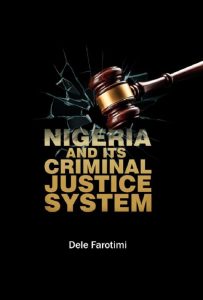
Nigeria and its Criminal Justice System cover | Source: Amazon
Now, imagine writing a book that calls out the “criminal” nature of a country’s justice system; and then ending up treated worse than the actual criminals casually walking free in that same country.
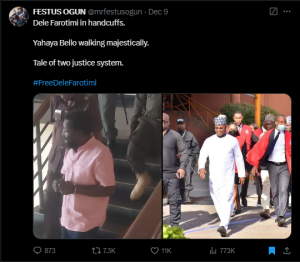
A post from a lawyer, via X.
For context, Yahaya Bello is a two-term former governor of Kogi State, currently facing a 19-count charge for criminal breach of trust and money laundering involving ₦80.2 billion. Yep, billion. The EFCC alleges that between 2016 and 2023, Bello funneled billions through shady transactions in both naira and foreign currency. He ghosted his trial at some point, came back to apologize, and was handed bail set at ₦500 million, with “conditions”.
But let’s circle back to Dele Farotimi. He dropped “Nigeria and Its Criminal Justice System” in July 2024, and… nothing much happened. Then, boom—December 3rd rolls around, and he’s suddenly arrested after Afe Babalola (a celebrated lawyer, to be precise) sues him for defamation. Farotimi spent 21 days locked up before finally securing bail at ₦30 million, with strict conditions like surrendering his passport and being slapped with a media gag order.
In a matter of weeks, we all witnessed how it transformed from a simple legal dispute into a national conversation about free speech, the lengths to which powerful individuals might go to protect their reputations, and whether Nigeria’s justice system has any integrity left (spoiler alert: not a lot of people think it does). And yeah, the public reaction has been heated. Honestly, I mightn’t even have heard about the book if it weren’t for the controversy blowing it up.
Reading the book was an experience—one of those that forces you to sit with uncomfortable truths. For me, it shows just how much we need more literature at the crossroads of activism and politics in Nigeria. Controversial books like these spark the kind of conversations we desperately need if there’s any hope for systemic reform. And like every Nigerian alive, I’m over here crossing my fingers and whispering, maybe one day, sha.
If you want to understand this whole saga better, I’d recommend checking out David Hundeyin’s analysis. He always brings the heat.
3. The Holy Land at War by Mark Patinkin
Since 2023, we’ve been drowning in news of the Israel-Hamas conflict; headlines, tweets, and banners on every website asking us to support the victims of the war.
Journalist Mark Patinkin’s “The Holy Land at War” is a raw, boots-on-the-ground account of this conflict.
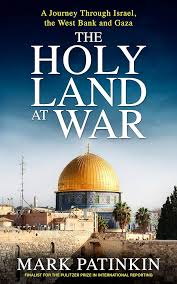
The Holy Land at War cover | Source: Amazon
He spent time in Gaza, the West Bank, and Israel, documenting the human cost and the political chaos. So if anything, the book was not going to be another propagandist puff piece.
But initially, Amazon said, “Nope.” Why? Well, the reasons were vague “violations of content guidelines.” No specifics. No clarity. Just a sudden blackout.
And even when Amazon shut the door, Patinkin appealed the decision, asking for reasons. Yet, the ban stayed in place, and that was that—for a while, at least. Then, the controversy started making the rounds in the press, until freedom-of-expression advocates called out Amazon for its lack of transparency. And just like that, the book was reinstated. No big apology, no acknowledgment of error. Just quietly back on the digital shelves. Suspicious timing? Absolutely.
When I came across Mark Patinkin’s Facebook post, I started following this whole thing closely.
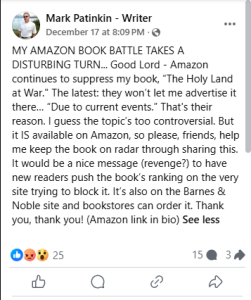
Mark Patinkin via Facebook
I noticed three things. First, the line between content moderation and censorship is getting blurrier by the day. Second, a handful of corporations like Amazon wield enormous power over what billions of people can and can’t access. Third, and the most painful, if you make enough noise, even giants like Amazon can be forced to reverse course.
It’s messy, it’s infuriating, and honestly, it’s a little terrifying.
4. Gender Queer: A Memoir by Maia Kobabe
Since it dropped, “Gender Queer” has been right in the middle of the ongoing debates around controversial books about LGBTQ+ themes.
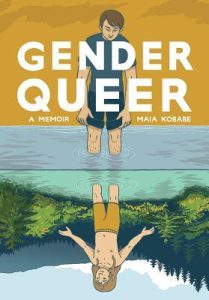
Gender Queer cover image | Source: Goodreads
It’s a graphic-illustrated memoir where Maia Kobabe takes us through their journey with gender identity. And while the book has sparked some much-needed conversation, it’s also become one of the most banned books in the U.S.
From most of the snippets I’ve already seen flying around Instagram, it’s not hard to see why. Some schools and libraries have even pulled it off their shelves, saying it’s not appropriate for younger readers, and that the graphic nature of some content crosses lines in terms of what’s okay for minors to access. On the other hand, and as expected, “Gender Queer” has found a solid group of supporters. This is all very tricky, in all honesty. We all know how literature can give space to voices that don’t always get heard, but the real work is in balancing free expression with community standards, especially when it involves underaged audiences.
5. The Kite Runner by Khaled Hosseini
If you’ve heard of “The Kite Runner”, you probably know that it’s one of those novels that sticks with you long after you’ve read the last page.
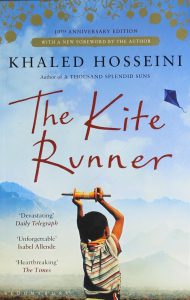
The Kite Runner cover image | Source: Littafi
But for all the accolades and love it’s received, it’s also sparked some serious controversy.
In recent years, this beloved book has faced bans in various schools. And in 2024, it faced newer bans all over again.
Yes, the story includes a lot of tough subjects like sexual assault, betrayal, and the brutal realities of war, especially the one that tore Afghanistan apart. These themes, along with some graphic content, have led to the book being deemed inappropriate for younger audiences.
But here’s where it gets even more complicated. Some Afghans have openly criticized “The Kite Runner”, arguing that it misrepresents the culture and people of Afghanistan. In particular, the portrayal of certain characters and the book’s depiction of Afghan society have rubbed some the wrong way. For them, it feels like a foreign lens trying to speak for a culture that’s much more nuanced than the version presented by Hosseini. This is a big reason why the book’s reception is mixed, even among readers from the same country.
But let’s zoom out for a second. Is “The Kite Runner” controversial because it’s inaccurate? Or is it because it dares to tackle difficult, uncomfortable issues that many other books shy away from? The truth probably lies somewhere in between, but what’s clear is that the story resonates, and honestly, I think that has always been my 105 responses to the 105 times I’ve seen “What makes a great story?” mid-job applications.
So despite the challenges, I think “The Kite Runner” remains one of the most impactful books of the 21st century. Sure, it’s uncomfortable to read, but I think literature should not be confined to the comfortable. I wrote a review of “The Kite Runner” earlier this year when I first heard about the controversy and binge-read Khaled Hosseini for days after that.
Bonus: Dr. Ally Louks’ Thesis on Olfactory Ethics
Yes, I know the difference between a thesis and a book (don’t come for me!), but hear me out: this work deserves a mention, because, it’s a thesis about books, and from an unconventional angle; smell. It’s a controversy that caused such a stink (pun intended) that I couldn’t leave it out.

Dr Ally Louks via X
This single post created a stir bigger than any of the controversial books I’ve listed here.
In fact, I had already finished my initial draft of this article when I realized I hadn’t included it. Huge oversight on my part, so I had to go back and tweak things.
After being dragged into the debate on Louks’ research, I knew I had to get my hands on the thesis. I immediately requested it from the University of Cambridge’s website.
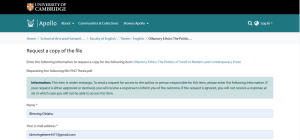
However, while wondering why I hadn’t received it just yet, I revisited the site and realized that it had been slapped with an “embargo.”
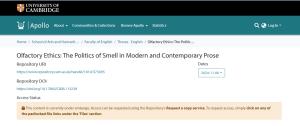
Now, what’s all the fuss about? This thesis is on the intersection of smell, ethics, and politics, and touches on issues like racial discrimination, environmental justice, and even gender politics. As niche as it might seem, the idea is something we’ve all encountered or at least pondered at some point in our lives. It’s also something that literature has long hinted at, and Dr. Louks decided to build her work around it, drawing from iconic books like George Orwell’s The Road to Wigan Pier, Vladimir Nabokov’s Lolita, and Patrick Süskind’s Perfume, among others.
But when celebrating the completion of such a gem and ending up amassing 120 million views on X, you can already guess the reaction. Her research became the subject of viral commentary, with critics quickly labeling her work as “over-the-top” for their taste.
The reactions got even more personal; I came across one user going off about how PhDs are being handed out to people who had apparently “barely scratched the surface” in their chosen field compared to years of hard work in more traditional sciences. He argued that Louks’ work—and the attention it was getting—undermined the hard-earned recognition that researchers in other fields, especially the hard sciences, deserved. (*Sighs)
This kind of sentiment isn’t rare, and I honestly enjoyed the thesis sparking a larger conversation about what qualifies as “worthy” academic work. It’s definitely not subjective, and I know that when I do get my hands on the full thesis, you can bet the first thing I’m doing is hunting down every book she referenced and adding them to my 2025 reading list.
Thoughts?
You might have gone through this list with certain expectations in mind, and I definitely didn’t mean for it to be exhaustive! If there’s a book you think should’ve made the cut, or if you have your own personal picks for the most controversial books of 2024, drop a comment and let me know. Thanks for reading!


Mike